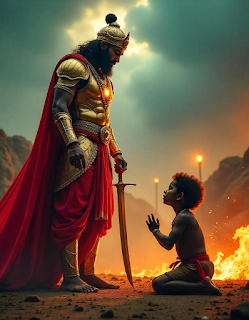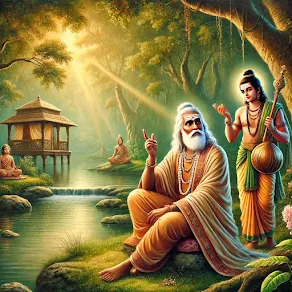ॐ Namo Bhagavate Vasudevaya
Shrimad Bhagavata Mahatmya
the story of parikshit blog
After the great Kurukshetra war, the Pandavas faced tragedy, betrayal, and the looming shadow of Kali Yuga. Amidst this turmoil, Krishna saved the unborn Parikshit, ensuring the survival of the Pandava lineage. This story unravels the end of an era, the rise of a virtuous king, and the inevitable cycle of life and destiny. Dive in to witness how divine intervention shaped the fate of the world. Lessons from King Parikshit’s Life
Soot was narrating -
"The sleeping children of the Pandavas were killed by Ashwatthama. Ashwatthama fought with Arjuna. To protect himself, Ashwatthama released the Brahmastra, but Arjuna used his own Brahmastra to neutralize both. Arjuna captured him. As a disciple and a Brahmin, Arjuna was initially planning to release him out of mercy. But Draupadi, who had become childless, insisted that he should be punished and dishonored. Krishna, however, advised Arjuna not to kill him. Bhima, on the other hand, wanted Ashwatthama to be killed. Ashwatthama had a divine jewel on his head. Arjuna, after taking the jewel, released him.
 |
| King Parikshit |
This incident took place after the great battle. Abhimanyu had attained martyrdom in battle. Uttara, his wife, was devastated. All the descendants of the Pandavas were dead. Krishna, along with Satyaki and Uddhava, was preparing to leave for Dwaraka.
lessons from king parikshits life
At that moment, Uttara rushed towards them, crying for help, "O Lord, something glowing like the sun is approaching me. It will destroy me and my unborn child, the last hope of the Pandava lineage. Please protect us!"
"Lord! Please protect my unborn child!" Her expression was full of terror, her eyes wide open. Krishna immediately realized that this was Ashwatthama's attack.
Arjuna, out of mercy, had spared Ashwatthama earlier, but the Brahmastra was still aimed at Uttara's womb. Krishna, in a subtle form, circled Uttara’s womb with Sudarshan Chakra, and the Brahmastra dissolved into the chakra. But who was in Uttara's womb?
The sages Shounak and others asked Soot to tell the story further. Soot, with a smile, continued:
"While in the womb, Uttara had seen a divine figure, a glowing, small, dark-skinned man dressed in yellow robes, holding a spinning wheel in his right hand. This vision left a lasting impression on the child. In due course, Uttara gave birth to a son.
The astrologers predicted that he would be a great, virtuous king, a universal monarch. Since he had seen Krishna in the womb, his name became Parikshit (the one who saw fully).
Dharmaraj Yudhishthir, overjoyed to see such a lucky and virtuous grandson, was filled with happiness.
Due to the violence of the Pandavas, Yudhishthir’s heart was heavy. He performed three Ashwamedha Yajnas to relieve his conscience. Krishna himself was present during the rituals. Afterward, Krishna, along with Arjuna, left for Dwaraka.
Vidura, on a pilgrimage, met Uddhava. After talking about devotion to Lord Krishna, he went to Maitrey Rishi to listen to spiritual knowledge.
Vidura returned to Hastinapur, where Dharmaraj inquired about his travels and the fate of the Yadavas. Vidura explained everything, but he did not mention the destruction of the Yadava clan, as Dharmaraj was already grieving the loss of Krishna and his family.
Due to the influence of Kali Yuga, Vidura no longer wished to live. He sought permission from Dhritarashtra to leave Hastinapur. Vidura persuaded Dhritarashtra to leave with Gandhari, and they departed secretly one night.
The next day, Dharmaraj went to the royal palace to offer his respects, but Dhritarashtra, Gandhari, and Vidura were no longer there. Sanjay, with tears in his eyes, informed him that they had left for a pilgrimage.
Dharmaraj, deeply moved, reflected on the passing of his family and the teachings they had shared. Narada, the divine sage, appeared to console him, urging him not to mourn, as separation and death are inevitable for all.
Time passed, and Arjuna, who had gone to Dwaraka, did not return for several months. Dharmaraj grew anxious. He feared that Krishna’s divine work had ended, and that Arjuna might have met with some misfortune. He spoke to Bhima, Nakul, and Sahadeva, expressing his worries.
One day, a messenger arrived, announcing Arjuna’s return. As Arjuna entered, his physical appearance was disheveled, and his presence reflected great sorrow.
Dharmaraj eagerly asked, "What happened to Krishna? How is he?"
Arjuna, with a heavy heart, replied, "Maharaj, Krishna and I are no longer together. He has departed, and with him, our strength, our leader, our friend, and our guide are all gone. Now there is only darkness."
As Arjuna recounted the end of Krishna's life, how the Yadava clan destroyed themselves, and how Krishna met his death through a hunter's arrow, the sorrow of the Pandavas deepened.
The Pandavas, along with Draupadi, decided to renounce their kingdom and embark on a journey to the north. Their kingdom, once blessed by Krishna, was now abandoned. They traveled, step by step, towards their final destination, where they would seek spiritual liberation and renounce the material world.
http://www.flipkart.com/search?q=krishna+shirt
Along the way, they encountered various divine signs and symbols, representing the fading of the divine age and the rise of Kali Yuga. Parikshit, aware of his responsibility, continued to rule with wisdom, protecting his people, and following the path of righteousness.
 |
| KaliYuga and king Parikshi |
This is the story of Parikshit and the end of the Yadava and Pandava dynasties. It is a reminder of the transient nature of life, the divine purpose, and the inevitable journey of every soul."











